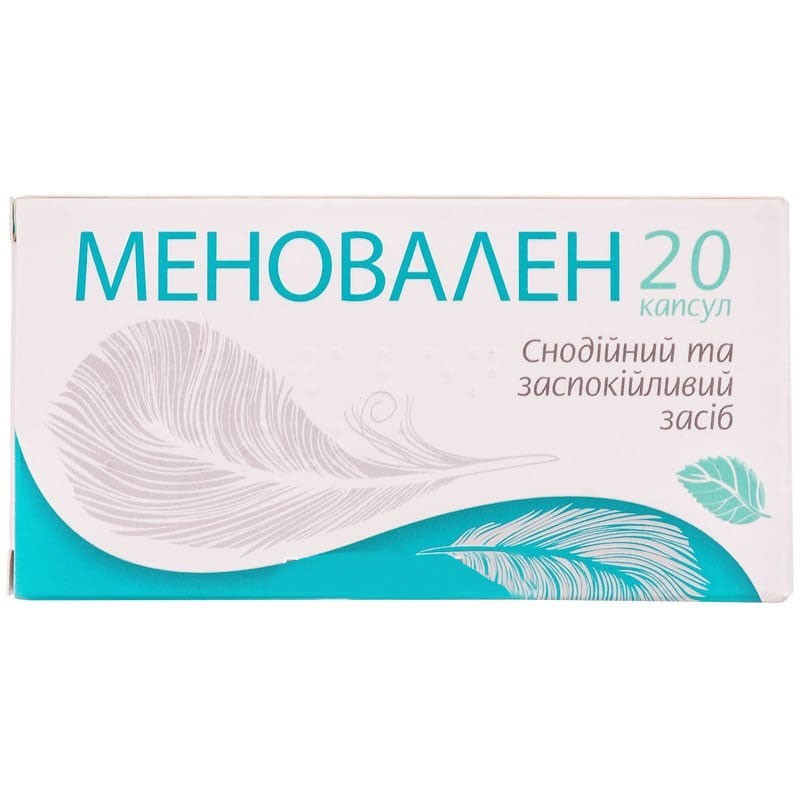



 Secure and encrypted payment processing
Secure and encrypted payment processing We ship to over 40 countries including the USA, UK, Europe, Australia and Japan
We ship to over 40 countries including the USA, UK, Europe, Australia and Japan Guaranteed refund or reship if you haven't received your order
Guaranteed refund or reship if you haven't received your orderMenovalen is a combined herbal preparation with a mild sedative effect due to its constituent components, valerian and peppermint. It has a weak calming effect, it is indicated to reduce weak transient nervous tension during mental exertion, excited state, irritability.
Valerian has a sedative effect, a positive effect on well-being with symptoms of irritability, such as anxiety, agitation and tension due to nervous overload. The drug contributes to faster falling asleep.
Peppermint is traditionally used in combination with valerian in sedatives.
The drug is used for neurosis, when taking potent sedatives is not practical.
Pharmacokinetics Not studied.
Neurosis accompanied by such symptoms:
Menovalen is prescribed to adults and children over the age of 12 years, 1 capsule 3 times a day 30 minutes before meals.
In the initial form of insomnia, the drug is used in 1-2 capsules 1–1.5 hours before bedtime.
The duration of treatment is determined by the doctor individually, but usually it is 3-4 weeks. If the condition has not improved within 14 days from the start of treatment, you should consult your doctor.
Hypersensitivity to valerian, peppermint or other components of the drug; severe arterial hypotension; depression or other conditions accompanied by depression of the central nervous system, severe drowsiness.
CNS: headache, dizziness, lethargy, drowsiness, depression of emotional reactions, depression, general weakness, decreased mental and physical performance, concentration of attention; in some cases - mental agitation, anxiety, insomnia.
Cardiovascular system: arterial hypotension, a feeling of squeezing behind the sternum, a feeling of palpitations, pain in the heart, heart rhythm disturbance (including bradycardia, tachycardia).
Digestive tract: dyspeptic symptoms, heartburn, nausea, diarrhea, cramping and pain in the abdominal cavity, with prolonged use, inhibition of the digestive process, constipation.
Hepatobiliary system: possible manifestations of hepatotoxicity.
Immune system: possible manifestations of hypersensitivity reactions, including skin rash, itching, urticaria, hyperemia, edema, shortness of breath, asthma.
Adverse reactions rarely occur, are reversible, usually develop when using the drug for a long time and a significant excess of the recommended doses.
In case of any adverse reactions should stop taking the drug and be sure to consult a doctor.
Do not exceed recommended doses of the drug.
When using the drug, it is necessary to refrain from drinking alcohol.
Patients with impaired liver function or a history of severe liver disease, persons with cholelithiasis should be careful when taking the drug.
Since peppermint is included in the preparation, patients with gastroesophageal reflux, achlorhydria, and hiatal hernia should avoid the use of the drug because of the possible increase in the symptoms of the disease. Use with caution in asthma.
Valerian can have a mild depressive effect, so the simultaneous use of the drug with synthetic sedatives is not recommended due to the potentiation of the effect.
With severe atherosclerosis of the cerebral vessels, the drug can be used only under the supervision of a doctor.
The capsule lid and body of the capsule includes a diamond black dye BN (E151), which can cause allergic reactions.
Possible specific sensitivity to the smell of valerian, peppermint.
Use during pregnancy and lactation. It is not recommended to use the drug during pregnancy and lactation due to insufficient data on the safety of its use during these periods.
Children. Menovalen is not used in children under the age of 12 years.
The ability to influence the reaction rate when driving vehicles and working with mechanisms. When using the drug, one should refrain from driving vehicles or working with mechanisms in connection with the sedative effect of the drug.
The drug can enhance the effect of tranquilizers (including chlordiazepoxide, diazepam), sedatives, sleeping pills (including phenobarbital, zopiclone, zolpidem), anxiolytic, antispasmodic drugs, central antihypertensive drugs, analgesics, antipsychotics, ethanol, drugs for nootropics , curariform muscle relaxants.
Concomitant use with synthetic sedatives is not recommended. Concomitant use with ethanol should also be avoided.
Symptoms: possible fatigue, general weakness, photosensitivity, headache, dizziness, drowsiness, cramping and abdominal pain, nausea, squeezing behind the sternum, tachycardia / bradycardia, hand tremor and dilated pupils, decreased hearing and visual acuity, increased severity of others adverse reactions.
Treatment: stop using the drug and be sure to consult a doctor.
If necessary, rinse the stomach, take activated charcoal, conduct symptomatic therapy.
In the original packaging at a temperature not exceeding 25 ° C.